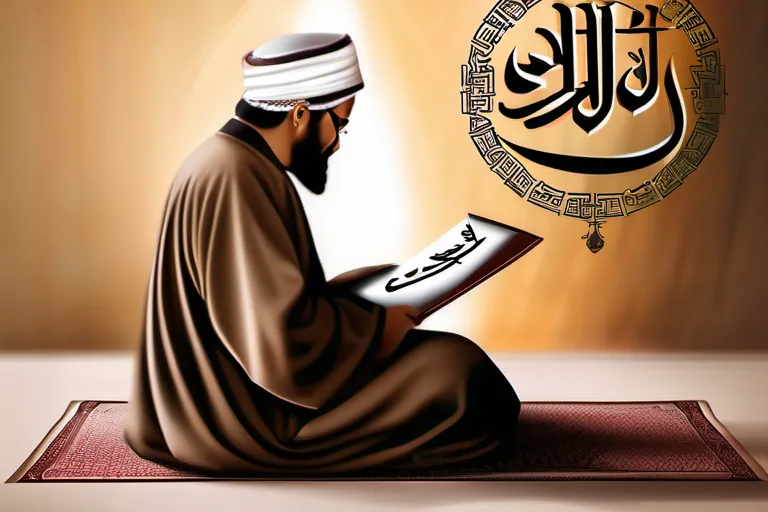Explore the origins, purpose, and types of fatwas in Islam
Fatwa is a religious decree issued by an Islamic scholar or jurist on a matter of Islamic law. In this article, we delve into the history, significance, and various types of fatwas.
The History and Evolution of Fatwas
The origins of fatwas trace back to the early days of Islam, where they served as a form of legal guidance and interpretation of Quranic and Sunnah teachings. Imagine, for instance, a small community in the Arabian Peninsula trying to navigate daily life with limited written laws—fatwas became their compass, pointing them towards what was right and wrong according to Islamic principles.
The purpose of fatwas has always been multifaceted. They are not just legal rulings but also serve as moral guides for Muslims around the world. Could it be that without these rulings, we would find ourselves adrift in a sea of uncertainty? Fatwas act like lighthouses, guiding believers through the tumultuous waters of everyday life.
Over time, fatwas have evolved to address new challenges and questions. From the early years when they primarily dealt with personal conduct and rituals, modern fatwas often tackle issues such as technology, economics, and global politics. This evolution is like a river that broadens its flow over centuries, adapting to its surroundings while still maintaining its core essence.
There are different types of fatwas, each serving a specific purpose. Fatwa-i-hudud deal with punishments as prescribed by Islamic law, while Fatwa-i-Taharat cover issues related to cleanliness and purification. Fatwas can also be advisory in nature, guiding on best practices or suggesting courses of action that are ethically sound.
The history of fatwas is a testament to the adaptability and resilience of Islamic legal thought. As societies change, so do the questions and concerns they face. Yet, at their heart, fatwas remain rooted in the timeless teachings of the Quran and Sunnah, ensuring continuity with the past while addressing contemporary issues.
Understanding this evolution helps us appreciate how fatwas are not static but dynamic tools that continue to shape Islamic thought and practice in a rapidly changing world. Can you imagine the challenges faced by scholars as they issued rulings centuries ago? Their wisdom and insight laid the groundwork for our understanding today.
Understanding Islamic Law and Scholars
Imagine Islamic law as a vast, intricate map guiding Muslims through their daily lives. Just like how maps have been drawn to help travelers navigate unfamiliar territories, Islamic law serves as a compass for believers navigating the complexities of ethical and moral decisions. This legal system is known as Shariah, which literally means ‘the path to water’ – an analogy suggesting that following these laws leads one to spiritual life.
The scholars who interpret Shariah are often compared to lighthouse keepers. These individuals, known as muftis or fuqaha (legal experts), play a crucial role in interpreting the law for contemporary issues and guiding their communities. Their wisdom and knowledge of Islamic texts such as the Quran and Hadith form the basis of their fatwas.
One might wonder: How do these scholars come to their decisions? The process is intricate, involving not just a deep understanding of religious texts but also an awareness of contemporary contexts. Scholars must consider various factors before issuing a fatwa, ensuring that their rulings are both relevant and applicable.
Take the role of a scholar in resolving disputes, for example. They may need to balance historical precedents with modern realities, making sure that their decisions align with the broader principles of justice and fairness prescribed by Islam. It’s like trying to fit pieces of a puzzle together, where every piece must align perfectly to form a coherent picture.
Another important aspect is the diversity among scholars. Just as there can be different interpretations in any field of study, Islamic legal opinions (fatwas) also exhibit a spectrum of views. Some scholars might lean towards a more literal interpretation of scripture, while others may favor a more flexible approach that takes into account contemporary societal changes.
Understanding the role of these scholars and their fatwas is crucial for grasping the dynamic nature of Islamic law. It’s not just about adhering to ancient texts but also about applying timeless principles to ever-changing circumstances. This process ensures that Shariah remains a living, breathing system capable of guiding Muslims in an increasingly complex world.
Types of Fatwas: A Closer Look
Now that we’ve delved into the principles of Islamic law and the role of scholars, let’s explore the different types of fatwas in Islam. Fatwas are like bridges, connecting personal questions to the broader teachings of the Quran and Sunnah. But how do these fatwas vary? Let’s examine them through a lens of personal matters, public affairs, and contemporary issues.
Firstly, let’s look at fatwas related to personal matters. These are like private consultations between an individual and their scholar. They cover topics such as marriage, divorce, inheritance, dietary laws, and daily rituals. For instance, a person might ask about the validity of their marriage due to a recent legal change, or how to pray correctly in a new setting. Each fatwa is tailored to fit the unique circumstances of the individual’s life.
Next, we have fatwas related to public affairs. These are more like city planners of Islamic communities, addressing issues that affect society at large. Examples include rules on trade practices, environmental regulations, and social justice issues. A fatwa might be issued on the permissibility of charging interest in financial transactions or on the rights of workers and consumers. These fatwas often provide a framework for ethical behavior in public life.
Lastly, there are fatwas related to contemporary issues. These are like cutting-edge tech in the world of Islamic jurisprudence. They deal with modern challenges that weren’t around when traditional texts were written, such as technology and digital privacy, women’s rights in the workplace, or environmental ethics. For example, a scholar might issue guidance on whether it is permissible to use artificial intelligence for decision-making processes. These fatwas require careful consideration of both classical teachings and contemporary contexts.
Each type of fatwa plays a crucial role in shaping individual lives and society as a whole. They are like the threads that weave together the fabric of Islamic practice, ensuring it remains relevant and dynamic even as times change. By understanding these different types of fatwas, we gain insight into how Islam adapts to new challenges while staying true to its timeless principles.
The Process of Issuing a Fatwa
Imagine a complex puzzle, where each piece represents a step in the process of issuing a fatwa. Just as a mosaic artist carefully selects and arranges tiles to form a beautiful picture, scholars in Islamic law embark on a meticulous journey to issue a fatwa. This process is not just about reaching an answer but ensuring that every aspect of the question is thoroughly examined.
The first step involves research. Scholars must gather information from various sources, including holy books, historical rulings, and scholarly works. It’s akin to diving deep into a library, sifting through countless texts in search of relevant insights—much like exploring a vast ocean for pearls of knowledge.
The second step is consultation. Scholars often seek advice from other experts to ensure that their understanding is comprehensive and unbiased. This process mirrors the way a doctor consults with colleagues before making a diagnosis, ensuring that no stone is left unturned in the quest for clarity and accuracy.
Once enough information has been gathered, scholars move on to analyzing and interpreting the data. This involves applying principles of Islamic law to the specific question at hand. It’s like navigating a maze where every path must be considered before choosing the correct route—each scholar’s interpretation can vary based on their understanding and the context.
The final step is reaching a conclusion. After extensive deliberation, scholars present their fatwa, which serves as guidance for the community. This is not merely stating an answer but offering wisdom that guides individuals towards compliance with Islamic law—much like a lighthouse guiding ships through treacherous waters.
This process ensures that fatwas are well-informed and deeply considered, providing a framework that respects tradition while adapting to contemporary issues. It’s a testament to the dynamic nature of Islamic scholarship, where knowledge is constantly being refined and re-evaluated in light of new circumstances.
Controversies and Criticisms Surrounding Fatwas
Controversies and criticisms surrounding fatwas often echo the complexities of interpretation and application within Islamic jurisprudence. How can a single voice, however knowledgeable, navigate the vast expanse of religious texts to provide guidance that resonates with every individual’s unique circumstances? It’s like trying to fit a square peg into a round hole—every person has their own set of beliefs, practices, and societal norms that make the application of fatwas both necessary and challenging.
The issues of interpretation are particularly contentious. A fatwa issued by one scholar might be seen as authoritative and binding by some, while others may reject it outright. This can lead to a fragmented understanding of Islamic law within the community. Is it not like building a puzzle where every piece must fit perfectly for the image to emerge? The challenge lies in ensuring that each piece—each fatwa—is aligned with the overall picture without causing unnecessary fractures.
Criticisms also arise from concerns about the politicization and misuse of fatwas. At times, these rulings can be used as tools to enforce a particular ideology or to suppress dissenting voices within the community. How can we ensure that fatwas are issued in the spirit of maqasid al-sharia, which seeks to protect the five primary objectives: religion, life, intellect, lineage, and wealth? Or is it possible for these rulings to deviate from their noble intentions?
The variability in legal and social contexts further complicates matters. What works in one country or region might not be applicable elsewhere due to differences in cultural practices and modern challenges like technology and globalization. It’s akin to trying to adapt a traditional recipe to contemporary tastes while preserving its essence—no easy feat.
Understanding these controversies requires empathy and nuanced dialogue. How can we foster an environment where different interpretations are respected and discussed constructively, rather than dismissed outright? The path forward may lie in embracing diversity of thought and encouraging open-mindedness among scholars and the general public alike.
The Impact of Fatwas on Society and Islam
The impact of fatwas on society and Islam is profound, much like the ripples from a stone dropped into a tranquil lake. Fatwas can shape the landscape of Islamic communities, influencing everything from personal behavior to societal norms. Have you ever wondered how these religious rulings influence daily life?
Consider fatwas as guidelines from above, offering direction in a world full of complexities and uncertainties. They help navigate the intricate maze of modern challenges by providing clarity through traditional Islamic perspectives. But their impact goes beyond mere guidance; fatwas can be catalysts for change or division within the Muslim community.
For instance, during times of crisis such as war or natural disasters, fatwas play a crucial role in providing moral and spiritual support. They offer solace and direction to individuals grappling with difficult decisions. Yet, these same fatwas can also spark heated debates, especially when they address sensitive topics like women’s rights or the permissibility of certain technologies.
Moreover, fatwas have increasingly become a platform for contemporary Islamic scholars to voice their opinions on global issues. This has led to a rich discourse within the Muslim world, fostering both unity and diversity in understanding and practice. However, these debates can also highlight the divide between traditionalists and reformists, questioning whether modern contexts require reinterpretation or strict adherence to classical texts.
The influence of fatwas extends beyond religious boundaries, impacting interfaith dialogue and global perceptions of Islam. How do you think these rulings affect the broader understanding of Islam in a secular world? Do they serve to bridge divides or widen them?
Conclusion
 By understanding the role and importance of fatwas in Islam, readers will gain a deeper appreciation for the richness and complexity of Islamic law and its interpretation.
By understanding the role and importance of fatwas in Islam, readers will gain a deeper appreciation for the richness and complexity of Islamic law and its interpretation.











